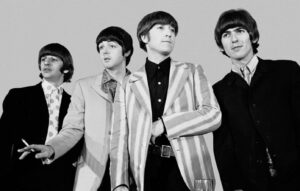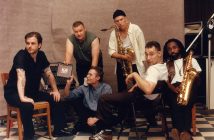New deluxe edition of the Beatles' 'Revolver' is a fascinating window into the creation of one of the greatest albums of all time.
-
10
You’d imagine that 60 years since ‘Love Me Do’, pop culture might have moved on from the Beatles; that everything that could possibly be said about them has been said by now? Surely? Wrong. The Beatles are still the figureheads of the entirety of popular music and are as relevant – and as popular – today as they were back in 1962, with every last note in their discography still being obsessively pored over by Beatles fanatics, both young and old – Beatlemania is as rampant as it’s ever been. So the fact that Revolver – still the Beatles’ coolest album – has been remixed and remastered alongside a plethora of previously unheard demos, backing tracks and alternate takes is BIG NEWS, and gives us Beatles zealots more content to micro analyse until we get real jobs.
A highlight of Peter Jackson’s Beatles documentary-film from last year, was watching Paul McCartney noodling away on his guitar in between rehearsals, almost absent-mindedly composing ‘Get Back’ in real time: it was nothing short of magic – and that same magic is woven throughout this new super-deluxe edition of 1966’s Revolver. It gives us not only unprecedented insight into the creation of one of the greatest albums of all time, but a window into the dynamics between John, Paul, George and Ringo at such an innovative and transformative moment in their careers. But first, a bit of context… Revolver marked the start of Beatles 2.0: following on from the low-key loveliness of Rubber Soul, which incorporated elements of folk and psychedelia and was, by-and-large, a fairly straightforward affair, Revolver was the point at which the Beatles properly became masters of their craft. It is here that they began experimenting; using the studio as an instrument in itself, and saw them incorporate musical elements such as string quartets, backwards guitars, horn sections and Indian instruments into their repertoire, which was highly innovative for its time. It’s an album that traverses – and often transcends – genres, and spans from the childlike nursery-rhyme-style charm of ‘Yellow Submarine’ to whatever ‘Tomorrow Never Knows’ is. In short, it’s a banger. But you knew that already.
What’s fascinating about this revamped edition of Revolver, is being able to hear the album in its developmental stages, when songs that have become so definitive were still in their infancy and subject to change. For example, the work-in-progress versions of ‘I’m Only Sleeping’ (which is perhaps my favourite song from the album), are scruffy and charmingly unrefined; take 5 in particular is faster and freer than the final version, and has got a really brilliant troubadour feel to it, often sounding like Iggy Pop’s ‘The Passenger’. Also significant is the evolution of ‘Tomorrow Never Knows’: it’s arguably the coolest thing the Beatles ever did and still feels like absolute madness every time you listen to it, so it’s strange to hear it in its first incarnation, which is considerably slower, giving a haunting, almost queasy quality to an already hypnotic song (I suspect George took inspiration from it too, as it sounds just like his similarly spooky and underrated ‘Blue Jay Way’). Another gem is ‘Yellow Submarine’: it’s baffling that such a massive anthem – a song so embedded in popular culture it’s practically public domain – started its life as a melancholic Lennon-lead folk-tune about loneliness, its lyrics lamenting that “In the place where I was born/ no one care[s], no one care[s]”. I wonder who suggested the song could benefit from more submarine-based lyrical content. All the same, it’s a highlight in an album of highlights.
Paul more than pulls his weight on Revolver with album standouts ‘Eleanor Rigby’ and ‘Here There and Everywhere’, and the criminally underrated ‘For No One’, however his more upbeat output – and I know I’m probably alone in thinking this – feels a bit…disposable (as much as any Beatles song could ever really be disposable): the sunny Motown-influenced ‘Good Day Sunshine’ and ‘Got to Get You into My Life’ I’ve always thought were somewhat twee and overly polished, lacking the edge that permeates the rest of the album, so the inclusion of alternate takes that show a more raw, unrefined side to these songs is brilliant. The first take of ‘Got To Get You Into My Life’ in particular, is a significant improvement, greatly benefitting from the removal of that grating computerised-sounding horn section, which I’d say is the only aspect of Revolver that has dated somewhat; without the brass, it sounds edgier, and its use of spiky guitar chords sounds like a definite precursor to Sgt Peppers’ ‘Getting Better’. Also interesting is the inclusion of non-album single ‘Paperback Writer’ and it’s B-Side ‘Rain’: both of these songs were released in early 1966, a few months before Revolver’s release, and it’s fascinating to hear just how well they cohere with the rest of the album, encapsulating such an innovative, psychedelic period in the Beatles’ existence.
And it’s not only the songs that are significant: a number of tracks consist purely of chit-chat, for example, a whole track is dedicated to snippets of conversation between McCartney and (presumably) George Martin et al, in which they discuss whether or not to use vibrato in the string arrangement for ‘Eleanor Rigby’. It’s a fascinating insight into the making of what is probably one of Revolver’s most defining songs. Similarly, hearing Paul and John get a massive fit of the giggles on ‘And Your Bird Can Sing’ is a charming, very human moment on an album that can sometimes feel a little bit impenetrable, though it’s also slightly bittersweet taking into account various tensions that would arise within the group in a few years time.
In summary, Revolver is impeccable. It’s an absolute storm of an album with every Beatle on top form – Paul at his most heartbreakingly tender; George’s songwriting talent finally blossoming, John writing some of the most stone-cold songs of his career, and Ringo was also there. For geeks like me, Revolver is a sort of rite of passage and when going through that inevitable phase of properly discovering the Beatles, Revolver tends to stick out – it’s got a certain street-cred, a punkiness to it which is so appealing, and in my teens it was the Beatles album I’d always say was my favourite (even though it was more likely Rubber Soul). Those first few staccatos of guitar in ‘Taxman’ are still as electrifying today as they were in 1966, and to be able to hear all the album’s nuances and idiosyncrasies amplified – whether that be via remixed editions of the original songs, or glimpses into their unpolished prototypes – is a wonderful thing. Someone should give Giles Martin – the mastermind of all this – a very firm pat on the back. Thanks Giles.




